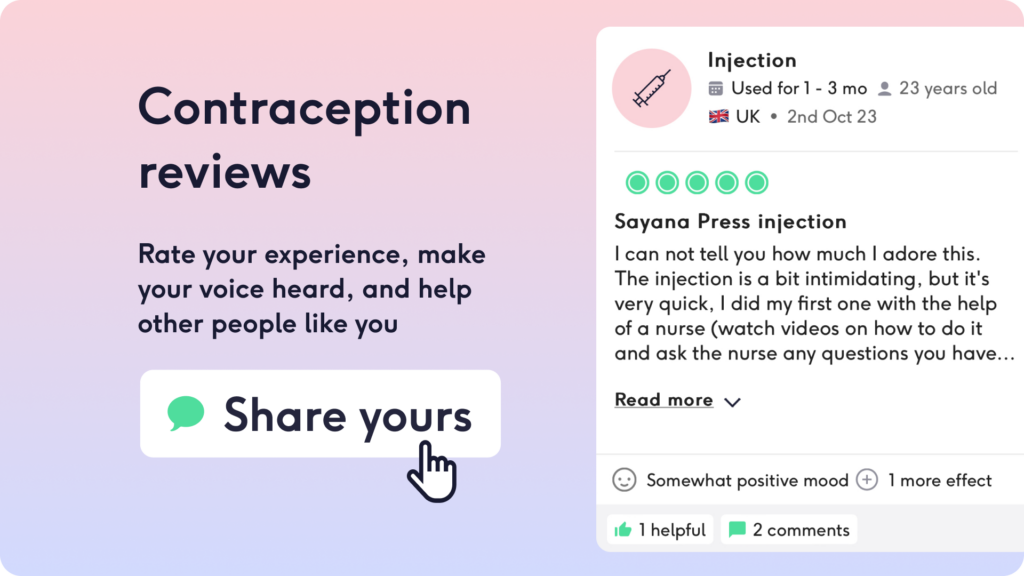
What treatments actually work for PCOS?
In this article
What's the lowdown?
PCOS is a common condition and affects people who have it in different ways.
Treatment includes:
- Keeping you healthy in the long term;
Keeping your womb healthy in the long term;
Managing symptoms such as fertility delays;
Maintaining good mental health and lower stress levels.
What happens after you get diagnosed? – being left in the dark after getting your diagnosis
After getting a diagnosis of PCOS it is easy to feel lost and unsure about what is best to do next. While PCOS cannot be cured, thankfully there are lots of things you can do to maintain good health and manage your symptoms
Make sure you keep a log of your periods and tell your healthcare provider if you are having less than 4 per year (if you’re not on hormonal contraception) because this needs treatment.
If you are on contraception, but getting unwanted side-effects like acne, you may want to discuss if switching might be helpful.
If you are trying to conceive, asking for help from a fertility specialist can help to improve your chance of success.
Keeping an eye on your weight and maintaining this at healthy levels can be really beneficial at managing PCOS and keeping symptoms under control.
Your doctor can prescribe treatments for acne such as topical creams and oral antibiotics.
If excess, annoying hair on the face and body is a symptom then standard hair removal treatments and bleaching may be helpful too.
The Lowdown Community Spoke! Here is what you find most helpful
Exercise
The general recommendation is that all adults should undertake physical activity; doing something is better than none at all!
A combination of cardio and strength training is best, with a minimum of 150 minutes per week of moderate to vigorous intensity spread throughout the week. Muscle strengthening and flexibility is also important, and this should ideally be on two non-consecutive days of the week in addition to cardio exercise.
Dietary changes
PCOS symptoms can be linked to diet and weight. It can be really hard to lose weight with PCOS, so we advise to concentrate on health rather than the scales, this way, the weight often starts to come off anyway! Aim to eat healthily, particularly foods rich in unsaturated “good” fats like omega-3 and foods packed full of nutrients (such as folic acid, b-vitamins and magnesium), low glycaemic index foods and wholegrains.
Stress management
Stress can make everything feel worse and can lead to unhealthy coping mechanisms such as over eating, especially high GI foods and processed saturated fats. Trying to conceive can add to the pressure and keeping stress to a minimum can be hard to do.
Learning some good stress-busting techniques such as breathing exercises, meditation and practising yoga can all help to keep you in flow. Work on a good sleep routine as well to get those much needed z’s in!
Vitamin D
This gets a special mention because many in the Lowdown community have tried this and found it useful. The research between PCOS and vitamin D deficiency isn’t fully understood, but maintaining a good level may improve insulin sensitivity and regulate menstrual cycles and hormone levels. On the whole, if you live in the UK or any country where the sun doesn’t come out as much, your vitamin D levels likely need regularly topping up, especially in the winter months. If you cover up or stay inside a lot and if you have a darker skin tone, then you should take it all year round. A daily intake of 400 international units is advised for everyone, but up to 1000 international units per day is thought to be safe.
Inositol
Inositols are sugars found in fruits and beans, and they work alongside hormones in the body, including insulin. A breakdown with these connections can lead to insulin resistance and ultimately diabetes. It is thought that inositol supplements can improve PCOS symptoms. Taking an inositol supplement might be something to add to your daily PCOS management. It’s not something that can be prescribed, but there are lots of options that can be purchased online in the form of myo-inositol.

Contraception
Even if you don’t need contraception, managing your periods is key to keeping your womb healthy with PCOS.
Often, periods are very irregular which can be irritating. But this doesn’t always need treating if enough periods are happening. However, if a person with PCOS is having less than 4 periods a year, then this needs treatment to prevent the womb lining for overgrowing which can lead to problems in the future. Hormonal contraception is one way to protect your womb.
Treatment guidelines recommend starting with the combined oral contraceptive pill if you’re eligible. For those with symptoms of androgen excess in particular, aiming for a pill that has the least impact on androgen excess is important.
If you can’t take oestrogen, don’t worry progestogen only contraception can also be used as treatment for PCOS. The Lowdown medical team can help you find something that you best.
If you don’t fancy the idea of being on long term contraception, having a withdrawal bleed brought on by a progesterone pill like Provera 10mg for 10 to 14 days every 3 months will help to keep your womb healthy.
How can you manage PCOS through pregnancy? Can you take supplements?
Congratulations! The road to pregnancy with PCOS can be hard for some people, so if it has been a struggle for you, congratulations on making it through.
Advice on managing PCOS in pregnancy is much the same as for those who do not have PCOS, but with a few additions.
It’s important to take folic acid and vitamin D in pregnancy, ideally even before getting pregnant. If you have a BMI of over 30, the dose of folic acid should be 5mg which needs to be prescribed by your GP.
Vitamin D at a standard dose of 10 micrograms (400 international units) is recommended for all pregnant women.
The extra addition to management of PCOS in pregnancy is blood sugar monitoring. In those who are not pregnant, and have a high risk for developing diabetes, an annual oral glucose tolerance test (OGTT) to check blood sugar is advised to watch out for signs of diabetes developing. In practice, many doctors will perform an HbA1c as it’s a quick and easy blood test to do, and an OGTT takes several hours to perform.
Pregnancy can temporarily accelerate this process and lead to gestational diabetes, especially for those with PCOS. This tends to improve once the baby is delivered.
To check for signs of this in pregnancy an oral glucose tolerance test ideally should be offered before 20 weeks pregnant, and all pregnant women with PCOS should be offered an OGTT at 24–28 weeks pregnant. An HbA1c blood test is not good enough to check for diabetes in pregnancy. If these tests pick anything up – it’s a good thing to know, as you can have extra support to keep your pregnancy and baby healthy.
The Lowdown’s community online support
PCOS is a common condition and that means that there is a vast array of experience out there to learn from. You can use the Lowdown platform to read PCOS experiences and share your PCOS experience too so you can give back and help others. It’s win-win!
How can The Lowdown help?
Trying to navigate the symptoms of PCOS can be tough, but you don’t have to go it alone! It can be difficult to know where to start with PCOS, especially with misinformation online and short appointments with doctors. Why not book an appointment to talk your individual situation through with a Lowdown doctor and we can help you to gain clarity on what your best next steps are to looking after your health and managing your symptoms.
Our medical review process
This article has been medically reviewed for factual and up to date information by a Lowdown doctor.






